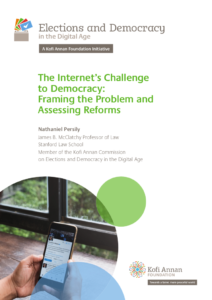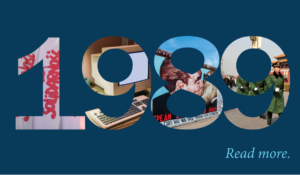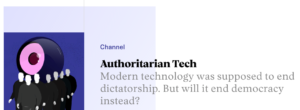 ….or will algorithms someday be used to optimize the ballot box, The Economist asks in a must-read long essay: @TheEconomist
….or will algorithms someday be used to optimize the ballot box, The Economist asks in a must-read long essay: @TheEconomist
When it comes to eroding an existing democracy, rather than shoring up a dictatorship, there are somewhat similar technologies on offer. Some are destructive. Social media, driven as its commercial interests are by the desire to “go viral”, offers ways to inject the equivalent of computer viruses into the public’s political information processing, degrading and distorting its output through misinformation, emotional incontinence and cognitive sabotage.
Some are less obviously abhorrent. Neither scoring for some sort of social credit nor sophisticated surveillance tools are the sole preserve of authoritarian states. Online, people happily allow firms to follow their every move—where they are, what they buy, what they like and even what they think—and build up profiles of them scored for any number of characteristics. State surveillance can gel with the self-administered form.
The “surveillance-based economic order”, as Shoshana Zuboff of Harvard Business School calls it, is not identical to what is growing in China. But the two systems have clear similarities, it adds. RTWT
 The original promise of digital technologies was unapologetically democratic: empowering the voiceless, breaking down borders to build cross-national communities, and eliminating elite referees who restricted political discourse, Stanford’s Nathaniel Persily and James B. McClatchy write in The Internet’s Challenge to Democracy: Framing the Problem and Assessing Reforms. That promise has been replaced by concern that the most democratic features of the internet are, in fact, endangering democracy itself, they observe in the report for the Kofi Annan Commission on Elections and Democracy in the Digital Age:
The original promise of digital technologies was unapologetically democratic: empowering the voiceless, breaking down borders to build cross-national communities, and eliminating elite referees who restricted political discourse, Stanford’s Nathaniel Persily and James B. McClatchy write in The Internet’s Challenge to Democracy: Framing the Problem and Assessing Reforms. That promise has been replaced by concern that the most democratic features of the internet are, in fact, endangering democracy itself, they observe in the report for the Kofi Annan Commission on Elections and Democracy in the Digital Age:
The rise of populism around the world has coincided with the communication revolution caused by the internet. The two are not, necessarily, causally related, but the regimes that feed on distrust in elite institutions, such as the legacy media and establishment parties, have found the online environment conducive to campaigns of disinformation and polarization that both disrupt the old order and bring new tools of intimidation to cement power. At the same time, the emergence of online disinformation campaigns alongside polarized perceptions of
political reality has eroded confidence in bedrock principles of free expression, such as the promise of the marketplace of ideas as the best test for truth.
End of Techo-Utopianism
 The Digital Innovation and Democracy Initiative’s network of experts continues to advance solutions for strengthening democratic values in the digital era. As part of German Marshall Fund’s report Reassessing 1989, Karen Kornbluh describes the role that government played in enabling the creation and growth of the internet and the need for government intervention to protect openness.
The Digital Innovation and Democracy Initiative’s network of experts continues to advance solutions for strengthening democratic values in the digital era. As part of German Marshall Fund’s report Reassessing 1989, Karen Kornbluh describes the role that government played in enabling the creation and growth of the internet and the need for government intervention to protect openness.
What to expect from Authoritarian Tech in 2020
The impact of authoritarian technologies is a focus of the latest episode of the Power 3.0 podcast from the National Endowment for Democracy (NED).

Coda Story
“I think the most concerning development is the increasing use of internet blackouts to cover up protests and repression,” said Dr. Jennifer Cobbe, who researches technologies and law at the University of Cambridge. And yet….
“For all the internet’s many problems, it’s still one of the primary ways by which vulnerable and oppressed people can reach the rest of the world, she told Coda Story’s survey of What to expect from Authoritarian Tech in 2020. “The more that authoritarian governments are willing to shut down the internet, the less chance those people have of reaching us, and the less chance we have of mobilizing to help them.”
Cities will become smarter

Waving Cat
“I think we will see ever more powerful or ever more ubiquitous smart city systems being installed around the world,” said Peter Bihr, a managing director of The Waving Cat, a German research and strategy company that explores how emerging technologies can have positive social impact. Bihr sees a trend towards more surveillance and control from authoritarian regimes, like China, across all digital spheres, but most visibly around Smart City tech.
The Omidyar Network is funding a new two-year initiative with the international, independent nonprofit Social Science Research Council (SSRC) to examine social media’s role in elections and democracy. Through research convenings, workshops, and small grants, SSRC will work with the research community to advance new or enhance existing approaches to collecting and analyzing proprietary social media data.
 The industry of social media manipulation is available, cheap and efficient, while the largest social media platforms are failing to tackle coordinated inauthentic behavior online, the EU East StratCom Task Force’s Disinfo Review adds. These are the troubling findings of the latest study presented by NATO Strategic Communications Centre of Excellence in Riga (NATO CoE). Here’s what they found:
The industry of social media manipulation is available, cheap and efficient, while the largest social media platforms are failing to tackle coordinated inauthentic behavior online, the EU East StratCom Task Force’s Disinfo Review adds. These are the troubling findings of the latest study presented by NATO Strategic Communications Centre of Excellence in Riga (NATO CoE). Here’s what they found:
1. Russian service providers dominate the social media manipulation market. Virtually all of the major manipulation software and infrastructure providers identified by the NATO CoE originate in Russia. …
2. The cost of manipulation services is linked to how successful the social media companies are at combating manipulation. …
3. More than 90% of bought engagement is used for commercial purposes (think about that the next time you see ads to buy a certain shampoo!)…
4. …however, the tools and methods developed to scam the advertising industry are also used for political interference. …
 5. It is the job of professionals: almost all of the manipulation service providers were highly responsive and engaged in “customer care”, answering questions, reacting to complaints and some even offered a guarantee to top up manipulation numbers, should the social media companies counter their efforts.
5. It is the job of professionals: almost all of the manipulation service providers were highly responsive and engaged in “customer care”, answering questions, reacting to complaints and some even offered a guarantee to top up manipulation numbers, should the social media companies counter their efforts.
6. It is all out in the open: forget the dark web and clandestine hackers. Manipulation service providers fearlessly promote their services and advertise on the biggest search engines…
7. The black market is huge. NATO CoE experts have identified hundreds of providers, several of them with many employees and significant revenue…..
One of the great arguments for democracy is what Fritz Schapf, a German scholar of politics, calls “input legitimacy”. Even if a system does not give people what they want, the fact that those running it reflect a democratic choice is legitimizing, The Economist observes:
Undemocratic governments have to develop some mixture of “output legitimacy”—giving the people what they want—and frank repression. Today’s information technology can help with both. It can provide not just data on what people want and will tolerate, but also the means to manipulate those desires. When such means are available to actors within or outside a state the struggle to gain, or for that matter retain, a democracy which reflects a genuine popular will might become even harder than it is.
This is the sort of idea that leads thinkers like Yuval Harari, an Israeli historian, to suggest that ever more capable information technology means that not just free-market economics but also liberal democracy might “become obsolete” over the coming century. RTWT







